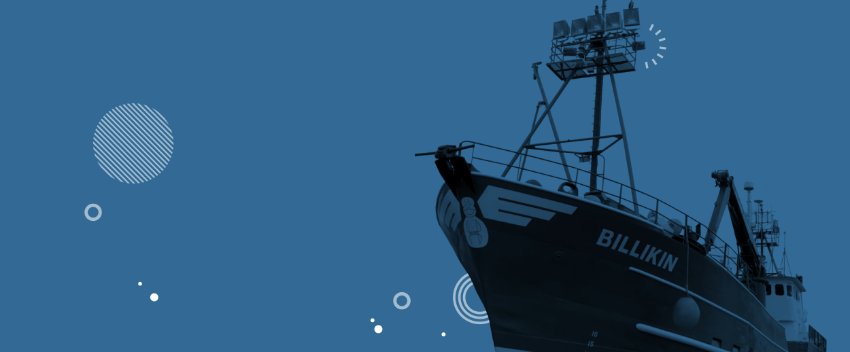Reflections on work life from a seafood industry giant
Joe Bundrant, CEO of Seattle-based Trident Foods, talks about the ins and outs of seafood industry seasonality, managing 9,000 employees worldwide, and staying on top of innovation as a family business.

The ship that started it all in 1973 for Trident Foods is called the Billikin. This was the first ship of its kind to catch and process king crab at sea – a game-changer that meant catches could be processed immediately, instead of waiting to come back to shore. When the Billikin first sailed, it had 28 men aboard.
Today, Seattle-based Trident Seafoods is a harvesting, processing, and marketing company for wild Alaska seafood. The company has more than 9,000 employees worldwide, including 1,600 independent fishermen.
With 25 processing plants in China, Japan, Europe, and the U.S., Trident harvests wild Alaska pollack, five species of salmon, Pacific cod, king crab, snow crab, Dungeness crab, and many other species, and packages and ships it to over 50 countries around the globe.
While Trident has grown its operations, it retains the principles of a family business at its core – and creating a family of fishermen, employees, and customers is what CEO Joe Bundrant says has been a consistent driving force for the company.
On location from the Billikin, Bundrant talks workforce support, the challenges of seasonality, and lessons learned at sea.
Q: With Trident having locations in Asia, Europe, and the U.S., and considering your industry, you have a very diverse employee base. Can you give us a view into its inner workings?
Joe: At the peak of our season, we have up to 9,000 employees. They come from all sorts of backgrounds and sometimes [from] all over the world with the H-2B visa program and working on different ships, and long hours. We have a support center here in Seattle that makes sure the men and women that are fishing or processing in these remote sites have the support they need to go about their daily lives.
We're an amazing company when it comes to people. Not only are the minds engaged, but the hearts are engaged as well. Recently, I havebeen to two very special events: one, a 40th anniversary for an employee that has no intent to retire any time soon; and a retirement for an individual that was with us over 35 years. The heartbeat of Trident Seafoods is its people and we're very blessed to have the industry's best.
Q: What are some challenges that are unique to your industry and diverse workforce?
Joe: One of the most unique aspects is the seasonality. We have certain plants that are only open six weeks a year. We have to fly in up to 700 employees, they work 16 hours a day, seven days a week during that period, and then we close the plant down for the rest of the year. That's the seasonality of wild Alaska sockeye salmon.
Hiring is one of our biggest challenges. We have to fill all the spots we have during the peak of the season. We're really blessed to have an incredible HR department, and also a lot of long-term returning employees. Our returning rate is the highest in the industry.
Q: Let’s talk more about that. What do you feel is the impact of HR on a company?
Joe: HR is not, to me, about the technical details of making sure people get paid or that they're where they're supposed to be on time. It's about making sure that they're taken care of and their lives are looked after – that they have bright futures.
What really drives us as family and as a business is that everybody in the supply chain can win, from the harvester to the processor to the customers around the world, we want to make sure that we create prosperity opportunities for all.
Our HR team is vitally important to the success of Trident Seafoods. They look after those up to 9,000 men and women throughout the state of Alaska and around the world, to make sure that their needs are met on a daily basis.
"HR, to me, is about making sure that our people are taken care of and their lives are looked after – that they have bright futures."
Q: Interesting finding: A Harvard Business Review article stated that while sometimes family firms aren’t viewed as being innovative (and are seen as being risk averse), research shows that many family-owned businesses are among the most innovative in their industries. How have you stayed on top of innovation, and continued to encourage it?
Joe: When I think about the Billikin, my dad's vision was [for it to be] the first boat to catch and process king crab at sea. Everybody said it couldn't be done. That spirit of innovation is alive and well at Trident Seafoods today.
This culture of innovation was certainly started by my father and it is alive and well, not just in me, but throughout our organization. When you talk about cornerstones of company's culture, innovation is a key to Trident's culture.
We continue to invest heavily in it. We have innovation centers in China, Japan, Germany and three throughout the United States that constantly innovate and try and bring new ways for people to try and enjoy the seafood we harvest. From a product perspective, our wild Alaska pollock burgers and our 10g Protein Noodles are two examples of that innovation that continues to drive us forward.
Q: As a family business, you’ve always said that culture is very important. When you started in the business, what were some key aspects in building culture for you?
Joe: We have a family retreat every year. I always tell my nieces and nephews and my own kids, "If you think your parents are being hard on you, tell them 'Thank you,' because they're preparing you for something greater in your life."
My first paycheck was on the boat that was built after the Billikin, the Bountiful, in 1979. And starting as a processor, as a 12-year-old working 16 hours a day, seven days a week, at sea with my dad was the foundation of teaching me work ethic.
My dad said, "You’ve got a good personality, why not try sales?" My total training was, "Here's an inventory, and here's a list of buyers in the United States, have at it." And I would start to call people and try and find ways to get our products to them across the country. We had a very small customer base.
Today, we've grown that to some of the greatest customer relationships in the world, big-name food companies that you would imagine, from restaurants to club stores to retailers around the world that really count on Trident Seafoods.
Q: And today, how do you see your culture and values come to life across your broader workforce?
Joe: It all starts at the top. My father instilled in me and not only me, but the other tribal elders, if you call them that, in the company, a real iron will to succeed.
Another real part of our culture is that your word is your bond. To have over 1,600 independent fishermen that choose, each year, to deliver their fish to us, none of them have any contracts. It's all a commitment just to buy their fish, to make sure we have good pricing, and we take care them on a year in and year out basis.
I love to find people to move throughout our organization who financed their college education by working in our remote processing plants, getting really on-the-job training. Then we move them the next year to a new spot. When they graduate –in whatever career they choose – if they understand where our heartbeat is, and that's access to resource in Alaska, they make a much better employee than someone that hasn't worked in these remote sites and doesn't have that same 16-hours-a-day, seven-days-a-week work ethic mentality. That mentality has become part of our company’s culture – and it is certainly alive and well.
Q: Let’s continue with the family business thread. What are some key lessons you’ve learned that you pass on to new generations coming in to the business?
Joe: We have several rules for our children coming into the business. One is rubber boots and dead fish training. You cannot lead if you haven't served, so spend time in Alaska, in the processing plants or on the vessels themselves.
Number two is get a college education. My dad started, never finished. I started, never finished. The business is too big and too complex not to have that foundation.
Number three is go get a job. I'm not going to call a friend and say, "Hey, would you give my kid a job in production because he wants to make films?" No, go find a job. So, the two daughters that work in the business both had careers for Fortune 500 companies, and found great success in that.
And most importantly, number four is that you have to have the heart of a servant-leader. You're not coming into this company and saying, "What do I get for working here?" but instead, "This is what I can give to the organization to make it better."
Q: The seafood industry has seen its share of challenges in the last few years, and will likely continue to do so. What do you see as part of the future of this industry, and what does it look like for your workers?
Joe: The regulatory environment, from OSHA to EPA to corporate social responsibility, all of these things are adding additional complexity to our company, and to our industry.
One of the biggest challenges would be an aging infrastructure. Our industry was really pioneered and built 30 to 40 years ago. So, the processing plants and the ships need to be rebuilt. And generating the revenue necessary to do that, the EBITDA necessary to do that, is a real focus of ours as an organization, and the industry as a whole.
"One of the biggest challenges in this industry would be an aging infrastructure."
It's just a matter of fact. You have to rebuild vessels. You have to rebuild plants. This may not always result in ultimate ROI, but it’s looking out for all your stakeholders along the way. One of the biggest assets we have is access to resource. But if you don't have a vessel capable of catching it, you can't harvest that great asset.
My goals for Trident Seafoods is that we have a long-term, multi-generational family business that operates with the highest level of integrity and serves its stakeholders, serves our fishermen, the communities in which we do business, our employees and our customers. We serve all of them and they're successful, our company will succeed as well.
This interview has been edited for length and clarity.
You may also like:
Ready to get started?

